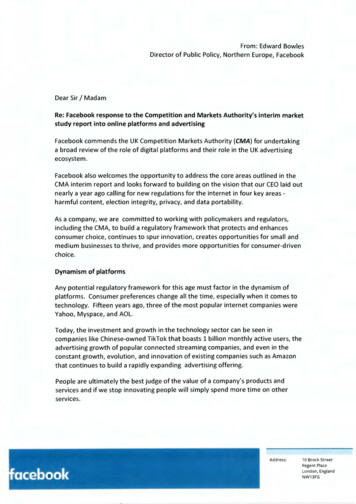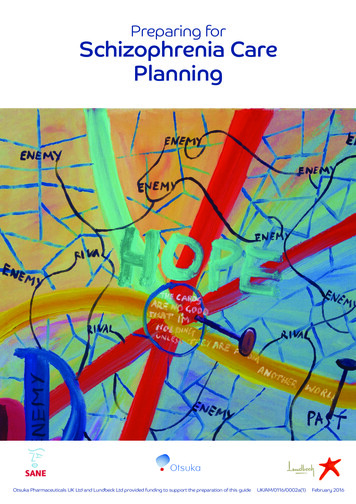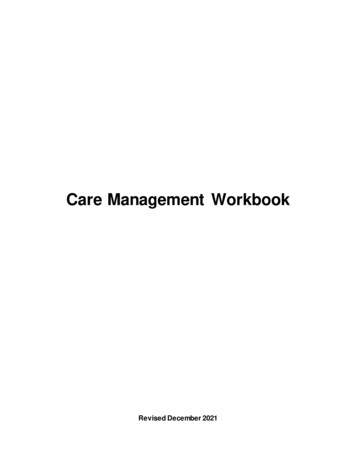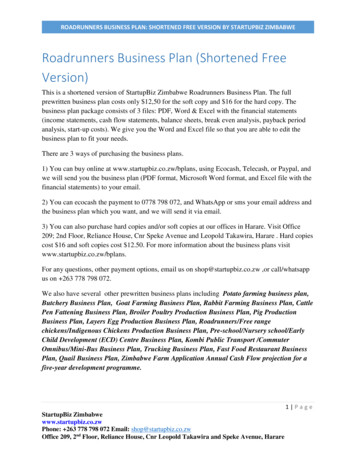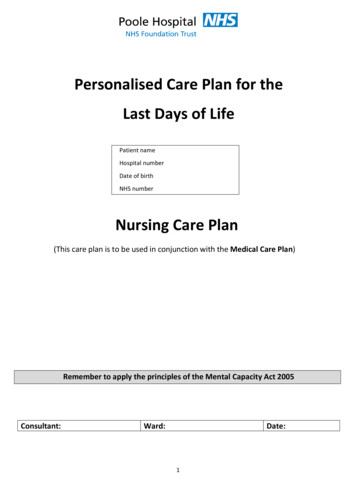
Transcription
Personalised Care Plan for theLast Days of LifePatient nameHospital numberDate of birthNHS numberNursing Care Plan(This care plan is to be used in conjunction with the Medical Care Plan)Remember to apply the principles of the Mental Capacity Act 2005Consultant:Ward:Date:1
Name: . DOB: .Hosp No: . NHS No: PERSONALISED CARE PLAN FOR THE LAST DAYS OF LIFEThis guidance is to aid the care of patients thought to be dying within the next few days. The patient’s care should beindividualised to their specific needs. If advice is needed at any stage, contact a member of the patient’s medical team,or the palliative care team on 8102 (8115 out of hours), or the Facilitator in End of Life Care on 2457.Family contact details1st contact: name: Relationship to patient: Telephone no: .Mobile no: .At any time:⃝Not at night time: ⃝If the patient’s condition changes, who should becontacted first?If the patient’s condition changes, when should they becontacted?2nd contact: name: Relationship to patient: Telephone no: .Mobile no: .At any time:⃝Not at night time: ⃝If the first contact is unavailable, who should becontacted?When to contact:Lasting Power of AttorneyPatient has a Lasting Power of Attorney (LPA) forHealth and Welfare⃝ Yes⃝ NoName of attorney – health and welfare: Telephone no: .Mobile no: .Recognition of dyingThe patient is aware that they are dying⃝ Yes⃝ No⃝ Unsure(If this has been recorded in the medical care plan thenrecord “see medical care plan”)Document what has been said to the patient and bywhom (see also medical care plan): . . .Name of family member or carer informed: Date and time conversation took place: Document what has been said and by whom: . . .The family are aware that the patient is dying⃝ Yes⃝ No⃝ Unsure(If this has been recorded in the medical care plan thenrecord “see medical care plan”)Information and explanation of facilities“Supporting care in the last hours or days of life”Information sheet to be given to relative/carerInformation sheet given ⃝ YesRelatives and carers to be given a full explanation offacilities available to them (should include verbal andwritten information)Should include information on car parking, bathroom &toilets, refreshments, payphone, accommodation,chapel, visiting times, etc.2⃝ No
Name: . DOB: .Hosp No: . NHS No: Religion and spiritualityPatient is given the opportunity to discuss what isimportant to them, including, faith, feelings, beliefs,wishes, and values.Religious tradition or spiritual beliefs: .Offer support of chaplaincy team/religious leader.Chaplaincy team /religious leader support accepted:⃝ Yes⃝ NoIdentify any specific needs at death or after deathNeeds at death/needs after death: . . . fSymptom managementConsider and address possible symptomsFor example, pain, shortness of breath, nausea, vomiting,restlessness, confusion, urinary retention, dry mouth etc.Document current symptoms:⃝ Pains (including sites of pain) ⃝ shortness of breath⃝ nausea⃝ vomiting⃝ restlessness⃝ confusion⃝ urinary retention⃝ dry mouth⃝ respiratory tract secretions⃝ other Consider whether any of these symptoms are reversible,for instance confusion caused by opioid toxicity orabdominal pain and restlessness caused by urinaryretention.Seek advice from medical team, or the palliative careteam if needed.Patient has anticipatory medications prescribedEnsure anticipatory medications are prescribed PRN onthe medication chart.Nursing observationsThe following observations have been discussed andagreed with the medical team (see medical care plan).Heart rateBPRespiratory rateTemperatureOxygen saturationsBlood sugarAll patients should be reviewed regularly to check theyare comfortable and not distressed.⃝ Yes⃝ Yes⃝ Yes⃝ Yes⃝ Yes⃝ Yes⃝ No⃝ No⃝ No⃝ No⃝ No⃝ NoFor patients receiving observations what actions shouldhappen if the observations are abnormal?If observations abnormal; contact .PEWS has been discussed and agreed with the medicalteam (see medical care plan).Should a PEWS call be triggered? ⃝ Yes⃝ No(discussed and agreed with the medical team)Feeding and fluidsAll patients who are able to take sips of fluids should beoffered regular drinks and food as appropriate. See Medical Care Plan.Record clearly in daily Personalised Care RecordPatients unable to take oral fluids/food will have MDTdecision regarding artificial hydration and nutrition. MDT discussion/decision; recorded in medicalnotes and daily Personalised Care RecordName of nurse completing this Care Plan:Signature:Date/Time:Grade:3
4
Supporting care in the last hours or days of lifeInformation sheet to be given to the family following discussionAs the end of life approaches it can be difficult to estimate how much time is left, butthis may now be as short as hours or days.We will do our best to make sure that . is as comfortable andwell cared for as possible.It can be difficult to take lots of information on board at a time like this, but we will doour best to explain things to you simply and clearly. If you have questions or justwant to talk things over with one of the doctors, nurses or chaplain, let us know.MedicationTaking tablets and other medication usually becomes more difficult as it becomesharder to swallow safely. We will stop any medication that is not helpful. We willmake sure that injections are available if needed, for instance to control pain,sickness, breathlessness and other symptoms. They will only be given if and whenneeded, just enough and no more than is needed to help the symptom.Reduced need for food and drinkWe will offer help and support with eating and drinking for as long as possible.However as part of the dying process, most people gradually lose interest in foodand drink. When a person stops eating and drinking it can be hard to accept evenwhen we know they are dying.Sometimes fluids given by a drip may be offered, but a drip will only berecommended where it is helpful and not harmful.Good mouth care is very important to relieve dryness. If you would like to help withthis, let us know.ComfortWe will offer help with personal care regularly. However, we recognise that it isimportant for you to have time and space just to be together. This is sometimes adifficult balance to achieve so please let us know if we need to do things differently,for whatever reason.Feel free to share as much of the physical care as you want, or if you prefer, supportby spending time together, sharing memories and news of family and friends.We understand this may be all very unfamiliar to you. Please let us know ifthere are any questions that occur to you, no matter how insignificant youthink they may be or how busy we may seem.We want to provide the best care we can.5
We can be reached during daytimes on: Night time: .Other information or contact numbers (e.g. palliative care nurse / district nurse): This space can be used for you to list any questions you may want to ask: 6
1 Personalised Care Plan for the Last Days of Life Patient name Hospital number Date of birth NHS number Nursing Care Plan (This care plan is to be used in conjunction with the Medical Care Plan) Remembe





